
- Panel
- 10:00 - 12:00
- 120 min
- Europejskie Centrum Solidarności - sala warsztatowa nr 5
FREE ENTRY
-
 Pavlina Janebovaresearch director, Association for International Affairs (AMO)
Pavlina Janebovaresearch director, Association for International Affairs (AMO) -
 Anna Żamejćspecialist in South Caucuses region focusing on human rights
Anna Żamejćspecialist in South Caucuses region focusing on human rights -
 Mariam Kaulashvili-Southwellactivist, co-founder of Civic Movement Daitove
Mariam Kaulashvili-Southwellactivist, co-founder of Civic Movement Daitove -
 Nino LezhavaCEPA non-resident fellow
Nino LezhavaCEPA non-resident fellow -
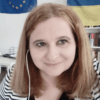 Iwona Reichardt - Moderationpolitical scientist, deputy editor-in-chief New Eastern Europe
Iwona Reichardt - Moderationpolitical scientist, deputy editor-in-chief New Eastern Europe
In Georgia, a former Soviet republic, the process of integration with Europe has been temporarily reversed, and the progress towards democratization slowed. Can Georgia draw inspiration from the experiences of Poland and Czechia? These and other questions will be the subject of this discussion.
Poland and Czechia share the experience of democratic opposition to the communist regime as well as peaceful transformation and accession to European structures – the European Union and NATO. To what extent is that an inspiration for Georgia?
Discussion panel implemented in cooperation with the College of Eastern Europe as part of the Polish-Czech Forum project for bringing societies closer together, enhanced cooperation and good neighbourliness 2025.
- Wydarzenie
- 15:00 - 16:00
- 60 min
- Europejskie Centrum Solidarności - wystawa stała, sala F
FREE ENTRY
The decoration was established by the European Solidarity Centre on the 45th anniversary of the creation of Solidarity. It will be awarded to persons exceptionally involved in the defence of human rights, not only in the civic sphere, but also in the fields of culture, science and education.
- Wydarzenie
- 17:30 - 19:30
- 120 min
- Centrum św. Jana
-
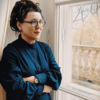 Olga Tokarczukwriter, Nobel Prize winner in Literature
Olga Tokarczukwriter, Nobel Prize winner in Literature -
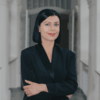 Magdalena Barbaruk - Moderationkulturoznawczyni, profesorka Uniwersytetu Wrocławskiego
Magdalena Barbaruk - Moderationkulturoznawczyni, profesorka Uniwersytetu Wrocławskiego
We invite you to a meeting with Olga Tokarczuk – a writer whose books and essays have been inspiring a deep, empathetic reflection on life and the world for years. The starting point for the conversation, led by Prof. Magdalena Barbaruk, will be the idea of tenderness, playing a leading role in Olga Tokarczuk’s texts and books. Can tenderness seen in the context of solidarity be the foundation for the ‘constitution of Europe’? The oeuvre of the Polish Nobel Prize winner gives an impulse to reformulate the idea of solidarity – from one based on universal human rights to solidarity based on the power of tenderness, not necessarily understood as love or compassion. The meeting with Olga Tokarczuk will also be an attempt to ‘think about Europe’ from the perspective of the periphery, to reflect on how to restore the attractiveness of democracy and to answer the question of how literature can help to achieve this goal.
- Koncert
- 20:00 - 22:00
- 120 min
- Polska Filharmonia Bałtycka im. F. Chopina
At the Baltic Philharmonic, Aga Zaryan, one of the best jazz singers in Poland, and the musicians of the Big Band Śląski under the direction of Grzegorz Nagórski will perform pieces by Polish jazz legends: Komeda, Wróblewski, Namysłowski, Karolak and Matuszkiewicz. We will also hear American jazz music standards, which were one of the sources of inspiration for this project. The selected compositions will provide the audience with many intriguing world-class sounds thanks to new arrangements by Michał Tokaj, Michał Tomaszczyk and Bartosz Pernal.
- Panel
- 10:00 - 11:45
- 105 min
- Europejskie Centrum Solidarności - audytorium
-
 Hanna WróblewskaMinister of Culture and National Heritage
Hanna WróblewskaMinister of Culture and National Heritage -
 Basil KerskiESC Director
Basil KerskiESC Director -
 Robert PiaskowskiNCC Director
Robert PiaskowskiNCC Director -
 Tim LardnerUNOPS Regional Director for Europe and Central Asia
Tim LardnerUNOPS Regional Director for Europe and Central Asia -
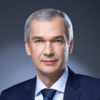 Pavel Latushkalawyer, diplomat
Pavel Latushkalawyer, diplomat -
 Oleksandra Matviichuklawyer
Oleksandra Matviichuklawyer -
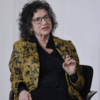 Susan Neimanphilosopher and writer
Susan Neimanphilosopher and writer -
 Jerzy Pomianowskidiplomat
Jerzy Pomianowskidiplomat -
 Ece Temelkuranwriter, journalist
Ece Temelkuranwriter, journalist -
 Katarzyna Kasia - Moderationphilosopher, author, journalist
Katarzyna Kasia - Moderationphilosopher, author, journalist
Official Opening Statements - Hanna Wróblewska, Minister of Culture and National Heritage of the Republic of Poland, Basil Kerski, Director of the European Solidarity Centre, Robert Piaskowski, Director of the National Centre for Culture
Democracies are weakened by the negative effects of globalisation and the lack of a vision of a modern social justice policy. Social tensions and digital media conducive to emotionalisation have changed the climate of public dispute. Polarisation is increasingly eliminating dialogue both on the national level and internationally.
Will we continue to follow a path that threatens human rights? Or will we be able to renew the culture of dialogue and social consensus to strengthen democracy and translate the ideas of social justice into the reality of the 21st century?
- Wydarzenie
- 12:00 - 13:00
- 60 min
- plac Solidarności
FREE ENTRY
-
 Lech Wałęsaeader of the Solidarity Revolution, Nobel Peace Prize winner
Lech Wałęsaeader of the Solidarity Revolution, Nobel Peace Prize winner -
 Hanna WróblewskaMinister of Culture and National Heritage
Hanna WróblewskaMinister of Culture and National Heritage -
 Beata RutkiewiczVoivode of Pomerania
Beata RutkiewiczVoivode of Pomerania -
 Mieczysław StrukMarshal of the Pomeranian Voivodeship
Mieczysław StrukMarshal of the Pomeranian Voivodeship -
 Agnieszka OwczarczakChairwoman of the Gdańsk City Council
Agnieszka OwczarczakChairwoman of the Gdańsk City Council -
 Aleksandra DulkiewiczMayor of Gdańsk
Aleksandra DulkiewiczMayor of Gdańsk -
 Basil KerskiESC Director
Basil KerskiESC Director -
 Jacek Bendykowskipresident of the Gdańsk Foundation
Jacek Bendykowskipresident of the Gdańsk Foundation
4 June 1989 is the day of the victory of the Solidarity revolution in the parliamentary elections. This date marks the beginning of Polish democracy and the wave of democratisation across Europe. We meet in Gdańsk, the cradle of Solidarity.
Solemn rise of the flags of Poland, the European Union, Pomerania, Gdańsk and Solidarity, accompanied by soldiers, singing the anthems of the Republic of Poland and the European Union
- Panel
- 14:00 - 16:00
- 120 min
- Europejskie Centrum Solidarności - audytorium
-
 Michał Bilewiczsocial psychologist, sociologist, professor
Michał Bilewiczsocial psychologist, sociologist, professor -
 Grzegorz Kwiatkowskiwriter, musician, activist
Grzegorz Kwiatkowskiwriter, musician, activist -
 Anna Materska-Sosnowskapolitical scientist, board member of the Stefan Batory Foundation
Anna Materska-Sosnowskapolitical scientist, board member of the Stefan Batory Foundation -
 Jacek Kołtan - Moderationphilosopher and political scientist, ESC
Jacek Kołtan - Moderationphilosopher and political scientist, ESC
The world of politics is more and more saturated with feelings. During the debate, we want to look for those emotions that offer the potential to turn the culture of fear and threat into a space of civic cooperation for the renewal of democracy.
- Panel
- 14:00 - 16:00
- 120 min
- Europejskie Centrum Solidarności - biblioteka
-
 Dariusz Filareconomist, writer, professor emeritus
Dariusz Filareconomist, writer, professor emeritus -
 Harold Jameseconomic historian, professor
Harold Jameseconomic historian, professor -
 Henrik Müllerjournalist, professor
Henrik Müllerjournalist, professor -
 Maciej Głogowski - Moderationeditor-in-chief and programme director of Radio TOK FM
Maciej Głogowski - Moderationeditor-in-chief and programme director of Radio TOK FM
In the post-growth era, we face the challenge of how to redefine the economy to better cope with sustainable development. We are faced with the question of an economy sharing the existing surplus; an economy that would challenge the modern dogma based on the imperative of ‘more’ and that would have the courage to think in a broad perspective of justice for all.
- Panel
- 16:30 - 18:30
- 120 min
- Europejskie Centrum Solidarności - biblioteka
-
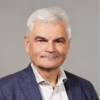 Edwin Bendykjournalist, Chairperson of the Board of the Stefan Batory Foundation
Edwin Bendykjournalist, Chairperson of the Board of the Stefan Batory Foundation -
 Aleksandra Przegalińskaphilosopher, professor
Aleksandra Przegalińskaphilosopher, professor -
 Anna Streżyńskalawyer
Anna Streżyńskalawyer -
 Katarzyna Szymielewiczlawyer
Katarzyna Szymielewiczlawyer -
 Grzegorz Piotrowski - Moderationsociologist, ESC
Grzegorz Piotrowski - Moderationsociologist, ESC
The enthusiasm for the Internet disappears, replaced by a sense of digital surveillance. How can civic politics regain the cyberspace and build a new shape of democracy based on digital tools?
- Panel
- 16:30 - 18:30
- 120 min
- Europejskie Centrum Solidarności - audytorium
-
 Leszek Jażdżewskipolitical scientist, editor-in-chief of Liberté!
Leszek Jażdżewskipolitical scientist, editor-in-chief of Liberté! -
 Elżbieta Korolczuksociologist, commentator and activist
Elżbieta Korolczuksociologist, commentator and activist -
 Arkadiusz Modrzejewskipolitical scientist, university lecturer
Arkadiusz Modrzejewskipolitical scientist, university lecturer -
 Paolo Morawskihistorian, journalist and publicist
Paolo Morawskihistorian, journalist and publicist -
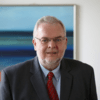 Andrzej Rychardsociologist, corresponding member of the Polish Academy of Sciences, professor
Andrzej Rychardsociologist, corresponding member of the Polish Academy of Sciences, professor -
 Mateusz Burzyk - Moderationtranslator, editor of the monthly Znak
Mateusz Burzyk - Moderationtranslator, editor of the monthly Znak
Not only does a crisis reveal systemic weaknesses, but it may also surprise us with possibilities for change. How do we overcome the ubiquitous violence, populism and wave of authoritarianism at the heart of the critical moments that define today’s world of wars and conflicts?
- Panel
- 19:00 - 20:30
- 90 min
- Europejskie Centrum Solidarności - ogród zimowy
-
 Agata Bielik-Robsonphilosopher and publicist, professor
Agata Bielik-Robsonphilosopher and publicist, professor -
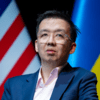 Samuel Chuhuman rights defender
Samuel Chuhuman rights defender -
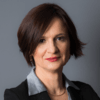 Vesna Marjanovićpolitician
Vesna Marjanovićpolitician -
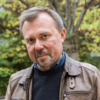 Andrii Portnovhistorian and essayist, professor
Andrii Portnovhistorian and essayist, professor -
 Basil KerskiESC Director
Basil KerskiESC Director -
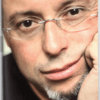 Andrzej Lederphilosopher of culture, professor
Andrzej Lederphilosopher of culture, professor -
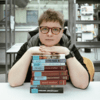 Taciana Niadbajpoet, human rights defender
Taciana Niadbajpoet, human rights defender -
 Ece Temelkuranwriter, journalist
Ece Temelkuranwriter, journalist -
 Olga Brzezińska - Moderationcultural manager, Adam Mickiewicz Institute
Olga Brzezińska - Moderationcultural manager, Adam Mickiewicz Institute
The Round Table Talks in the spring of 1989 between the communist regime and Solidarity opened the way for peaceful democratisation in Poland. Back then, the Polish Round Table became a model of transformation for Hungarians, Germans or Bulgarians. In 2019, on the 30th anniversary of the victory of the Solidarity Revolution, the ESC created a round table for dialogue in the new times of transformation. At this table, we want to talk about contemporary challenges for democracy – about solidarity, attitude towards others, elementary human rights, fear of revolutionary change. What choices do we need to make to defend the world of values?
- Koncert
- 21:00 - 22:00
- 60 min
- Europejskie Centrum Solidarności - audytorium
Zapraszamy na opowieść o muzyce europejskiej. Zaczniemy od Bacha, kompozytora najgenialniejszego, od którego rozpoczęła się era nowożytna w historii muzyki klasycznej. Skończymy utworem Arvo Pärta, jednego z największych żyjących twórców tej tradycji. Pomiędzy zagramy Mozarta, najjaśniejszego i najsprytniejszego, oraz Beethovena, najdzikszego i najśmielszego. A zaprezentują to wszystko jedni z najbardziej oryginalnych i wszechstronnych artystów na polskiej scenie muzycznej Marcin Masecki (fortepian) i Marcin Markowicz (skrzypce).
Marcin Masecki | Jeden z najbardziej oryginalnych i wszechstronnych artystów na polskiej scenie muzycznej. Gra na wszystkich instrumentach klawiszowych, komponuje, dyryguje, produkuje, aranżuje, śpiewa, edukuje i kuratoruje. Jego pierwszą pasją był jazz i muzyka improwizowana, dziś realizuje się w szerokim spektrum stylistycznym, a wirtuozowskie łączenie gatunków oraz łamanie granicy między sztuką wysoką a rozrywkową stały się jego znakami rozpoznawczymi. Jako klasycznie wykształcony pianista regularnie podejmuje wątek europejskiej spuścizny muzycznej, interpretując ją z rzadko spotykanym połączeniem swobody i erudycji.
Marcin Markowicz | Skrzypek, kompozytor, animator muzyki, pedagog. Koncertmistrz Orkiestry Polskiego Radia w Warszawie. Założyciel i drugi skrzypek Lutosławski Quartet, od dwudziestu lat dyrektor artystyczny Festiwalu Ensemble oraz Festiwalu im. Księżnej Daisy. Wykładowca Uniwersytetu Muzycznego im. F. Chopina w Warszawie. Prowadził kursy skrzypcowe i kameralne w Polsce, Wielkiej Brytanii, Włoszech, Grecji, Singapurze, Meksyku, Turcji i Korei Południowej. Wielokrotnie nagradzany, m.in. otrzymał wraz z Jazz Band Młynarski-Masecki „Złotą płytę“ za album „Płyta z zadrą w sercu“ (2020) i wraz z Lutosławski Quartet Nagrodę Fryderyk (2023).


